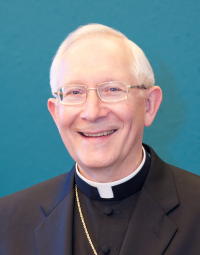
In an op-ed piece published in January in the Italian press, Cardinal Gerhard Muller, former prefect of the Vatican Congregation for the Doctrine of the Faith, said that in today’s age of “secularized thinking and mass media, political and ideological viewpoints end up contaminating theological judgment” to the point that, for some people, “the tenets of Catholic theology are suspected of ‘conservative’ or ‘liberal’ ideology, depending on their point of view.” Note the word “ideology,” which can be defined as “the integrated assertions, theories and aims that constitute a sociopolitical program.”
The Gospel certainly has sociopolitical implications. The Church advocates for an ethical and just social order based on truths that can be known not only by faith, but also by human reason. These truths have implications for how we order our so-ciety and how we live our individual lives. Tragically, our society today is repudiating both faith and reason in pretending to redefine the very meaning of the human person, with regard to sexuality, marriage and the right to life from conception until natural death. How do we respond to this challenge?
As Cardinal Muller points out, theological, spiritual and moral judgments can be “contaminated” — distorted — by ideology. This can happen when people assume a mindset that falls into the trap of “either-or” instead of “both-and.” To give an example: One person reduces the Gospel only to social justice to create a better world, and another reduces the Gospel only to a personal spirituality and salvation. What should be a “both-and” becomes an “either-or” and the result is a distortion of Catholicism because both understandings are meant to complement each other. As one theologian has said, “Truth is symphonic.” All the musical instruments have a part to play, but with-out each other there are only disjointed sounds, not a beautiful symphony.
Perhaps the greatest threat to our faith is the separation of the two things that most belong to each other, that are ultimately in-separable because they are of God and they are inseparable in the person and teaching of Jesus Christ. Those two things are love and truth. Today, we are being hounded, Archbishop Leonard P. Blair visited St. Maximilian Kolbe Parish, offering the Holy Sacrifice of the Mass at St. Thomas Church in Thomaston. At the beginning of the Mass, Archbishop Blair gifted the parish a first-class relic of Blessed Michael McGivney, who served as pastor of St. Thomas Church from 1884 until his death in 1890 and is on his way to becoming a saint. Father Joseph Crowley, pastor, accepted the relic and also concelebrated the Mass. A portrait of Blessed McGivney stands on the archbishop’s right.and even persecuted, in the name of love, to abandon some of the most fundamental truths that come from faith and reason about human personhood with regard to the things I mentioned earlier: sexuality, marriage and the right to life.
In the words of Pope Benedict: “Without truth, charity degenerates into sentimentality. Love becomes an empty shell, to be filled in an arbitrary way. In a culture without truth, this is the fatal risk facing love. It falls prey to contingent subjective emotions and opinions, the word ‘love’ is abused and distorted, to the point where it comes to mean the opposite.” (Caritatis in veritate, no. 3) C.S. Lewis has also wisely pointed out that the words of St. John’s epistle that “God is love” do not mean that “love is a god.” If we turn love into a god, then we can quickly and easily fall into rationalizing, justifying and blessing untruths in the name of love. This is, ultimately, the greatest betrayal of the love that God is, the love that Jesus is, and that he commands.
Love without truth, and truth without love, are both distortions that degenerate into ideologies. The right path is the one laid out for us by St. Peter in Chapter 2 of his first epistle: “Having purified your souls by your obedience to the truth for a sincere love of the brethren, love one another earnestly from the heart … ab-stain from the passions of the flesh that wage war against your soul. … Live as free people, yet without using your freedom as a pretext for evil, but live as servants of God.”
